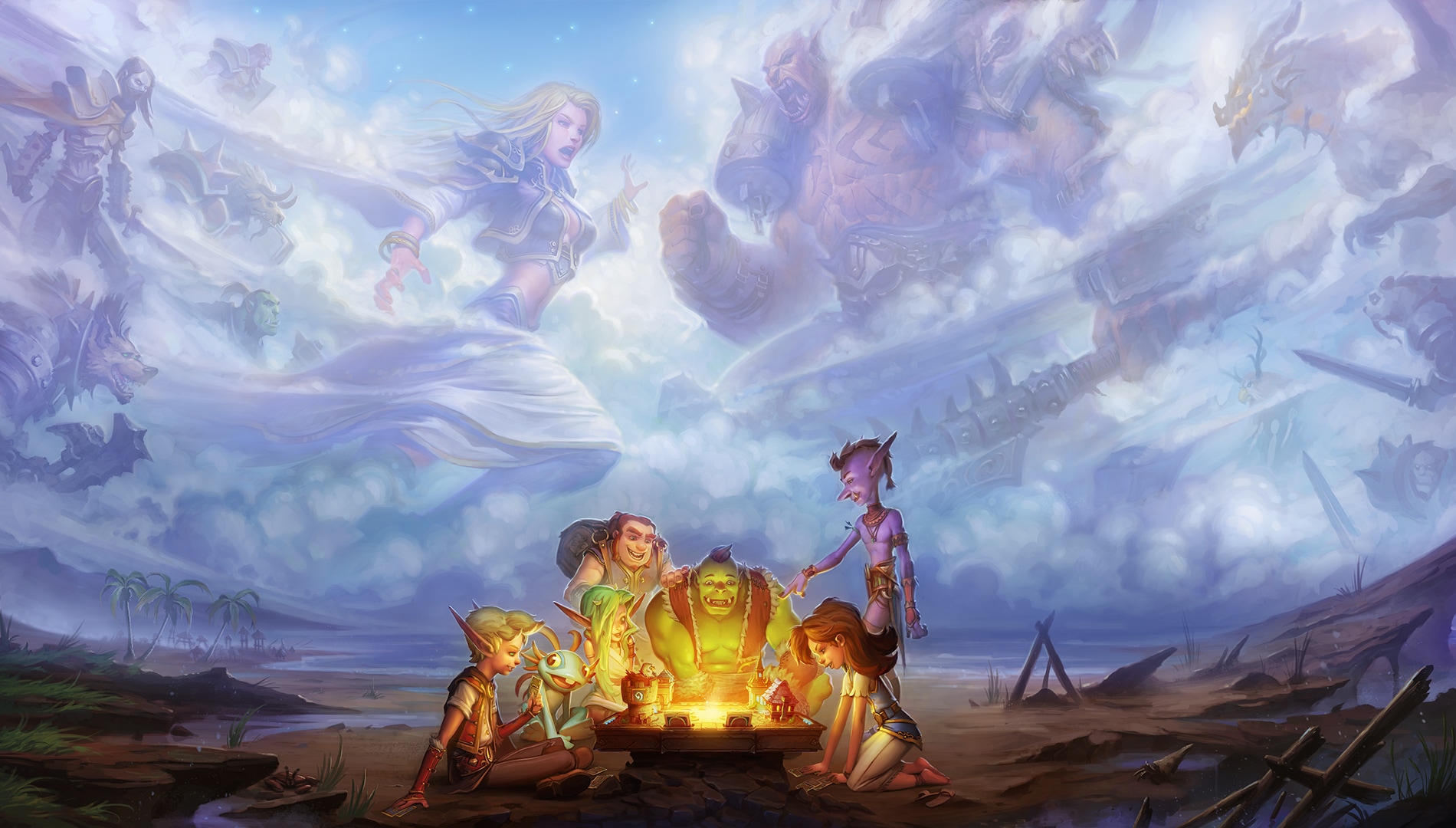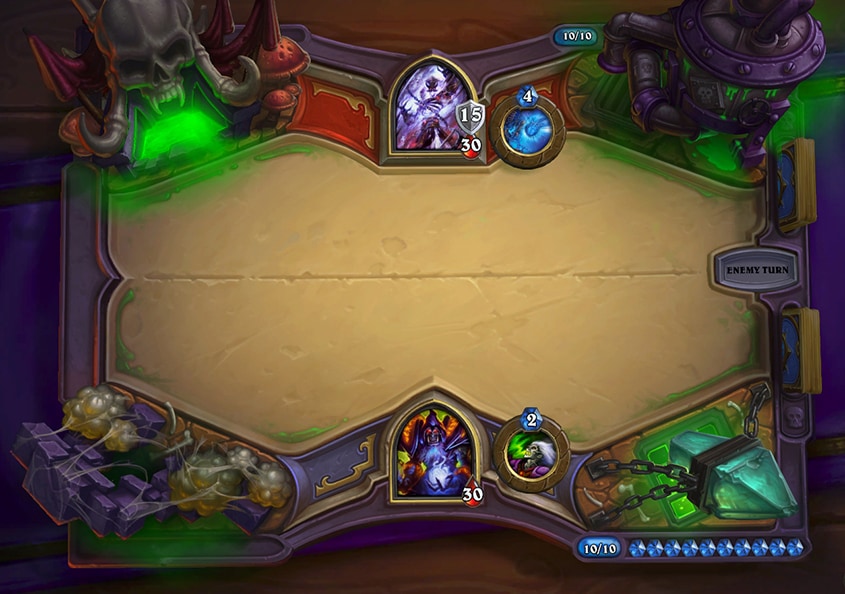Trending
Opinion: How will Project 2025 impact game developers?
The Heritage Foundation's manifesto for the possible next administration could do great harm to many, including large portions of the game development community.
Years ago I turned away from CCG/TCGs. This blog is about how Hearthstone pulled me back in and why it's such a leap forward in card games.

Like so many others over the past few months, I took the plunge, opened up my Blizzard client, and sat down to play Hearthstone. This is Blizzard's big push into the online card game market, and when I say big, I mean big. Tournaments at Dreamhack, payout bonuses, the works. You can accuse Blizzard of a lot of things, half-assing their games is not one of them.
I'm not going to delve into the general design elements of Hearthstone, enough has been said on its triumphs and failures to fill an entire series of articles. Rather, I'd like to speak about a few specific elements of Hearthstone as someone who was long ago burnt out on the idea of playing any kind of competitive card games.
Playing Magic in real life, for me, became equal to the modern theater-going experience: overpriced, loud, and leaving you with the feeling that you should have just stayed home and looked for something good on Netflix. Drafting, though fun, was also a form of torture.
Better to spend game nights with friends playing Descent, or burning through the latest multiplayer game for the Wii-U. Enter Hearthstone, a card game with all the lore of World of Warcraft, craftsmanship of Blizzard, and a Frankenstein's Monster of greatest card game hits.

I try to support games that have the potential to dent the behemoth that is Magic: The Gathering. I like fun games, I like it when fun games have large, dedicated communities.
That titan, that golden child of Wizards of the Coast has, for myself and many others, been the de facto name when you talk about trading card games. Sure, you can play the Game of Thrones game, or Netrunner, and both Pokemon and YuGiOh were pretty popular in my local scene back in the day, but it always came down to Magic.
Granted, Hearthstone is a collectible card game (CCG), which amounts to a considerable difference in how players amass collections. You can't play the card market like you can in Magic, and even buying your way to the best decks available is going to cost you.
Rather, what most excites me about Hearthstone is the sense that they're showing commitment to this game. This isn't a passing lark, they want this game to succeed and they will do everything in their power to make sure it does.
Writers from many outlets, including Gamasutra, have argued that the game is Pay-to-Win, giving those with enough cash an edge over those who don't. I don't believe that this is true, but it does reveal a certain aspect about the current state of Hearthstone, and about card games in general.
Top players making their F2P runs, notably Trump and Amaz, show that reaching legend can be done, but only after one has acquired the knowledge and play experience that comes with getting beaten down dozens of times. Knowing how card interactions work at a high level and having an innate understanding of how the best plays work is a factor of having already reached a high level of mastery. Reaching that level is not something that can be done easily or quickly unless you're pumping money into Hearthstone.
Arena is the best example of this in Hearthstone. Arena is a game mode where players construct a deck from random cards and then play games against other players until they either win 12 games or lose 3. At 150 gold per play, Arena runs are an expensive habit for the F2P player until they become good enough to become self-sustaining. Once you reach 7 victories in the Arena, all the gold you spent is reimbursed, in addition to earning you a free pack and maybe some extra gold. Going infinite like this is a big part of how master players earn their huge stockpiles of gold.
The catch is that, for the average player, there is little reason to play Arena. A dedicated redditor made this compelling argument that, for the overwhelming majority of players, Arena is not a wise investment of time or money. Most players will not reach 7 victories, and practicing to reach the higher tiers is both expensive and time consuming. For those who already good at Hearthstone, Arena is a great way to make gold, packs, and gold cards. It's not so great for everybody else.
But the problems with Arena are not the only issue plaguing Hearthstone. Like all card games, net decking is prevalent. It's easy for people to go online and figure out which deck is the most powerful and work towards that. It may take a while, but a Legend-tier deck can constructed in time.
But, while having a single top-tier deck might be within range of the average player, winning and competing at the highest levels requires multiple decks. Many decks act as hard counters to one another, and if you're running into the same archetype over and over and over again in a single night, you need to be able to react. Players with the resources to react can do that while F2P players can only hope that their next matchup is a favorable one.
Again, building a powerful deck is time consuming, but it's not the endless grind that advanced armor tiers in WoW were, or grinding for masteries in LoL. And luck, as in all things, will play a huge part for the average player for whom even ten dollars would be a large investment.
One of the things that I feel most card games lack is the sense of making their larger world feel alive. Magic, despite all its interesting flavor, has always felt contained, neatly packaged. Here's three sets in a world, then move on. There was a time when they had their novels, their extended story lines, but those days are long gone. It's all about the self-contained world, no big, epic tales that span years of the game.
Which is a terrible shame because a continuous thread can lead to so much more satisfying gameplay. Fantasy Flight is probably the best at this right now because of their Game of Thrones license. Every new addition to the CCG, released in booster decks according to chapters in the book is a masterstroke of integrating the source material with the game. As you read the books and watch the series, you can reenact what you're seeing with cards as they get introduced. Build a deck to recreate the Battle of Blackwater, or a Martel deck with Oberyn to face a Lannister deck running The Mountain.
Blizzard is poised to go one step further with the inclusion of "Adventures", mini-expansions that mimic famous raids and events from the Warcraft universe. Bosses from the raid act as bosses in the Adventure, with new cards and mechanics to make each one a unique challenge.
The mind reels with the possibilities. An adventure reliving the events of The Burning Crusade? The Fall of Arthas? Or any of the famous raids like the upcoming Naxxramas? For people who were heavily invested in Warcraft, this is a one-two punch of gaming nostalgia and legitimately expanding the game content into new and interesting directions. And given the sheer number of people who are at least aware of WoW's history, it's a remarkably potent combination.
Finally, there's something to be said about what Blizzard has done that will hopefully resonate with other digital card games developers in the future; the sheer production value. One of my greatest desires in life has been to play the game that R2D2 and Chewbacca were playing on the Millennium Falcon in Star Wars Episode IV, and I'm still waiting for studio to deliver.
While Hearthstone doesn't really fulfill the same awesome, nerdy desire, it make great strides in making the game feel more alive by infusing the cards with the kind of personality that Wizards and Fantasy Flight don't seem to have ever been able to capture.
It's the little attention to detail that elevates Hearthstone from an abstract card game to a closer representation of the struggle between heroes, between titanic forces, that the Warcraft universe has always tried to evoke.

It's what RPS's Robert Florence points to time and time again in what makes a good board game, the ability to see a story unfolding before you, to feel the flow and drama of what's happening as more than just abstract rules printed on pieces of cardboard with some pretty drawings on them.
And the cards, one could write a whole article on the cards alone. All minion cards have separate audio barks for when summoned, attacking, dying, many of which are either based on things they've said in the Warcraft world or that act as subtle references to the player created history of the game.
It was actually the Leeroy Jenkins card that reminded me of how powerful the history of the Warcraft universe is in reaching as many people as possible. People who have never played World of Warcraft know his eponymous battlecry. It's something that neither Magic, nor YuGiOh, nor any other card game has really been able to do, that's to make Hearthstone feel like an actual part of the larger world. Hearthstone is not the limit of the world, it is a small bubble of the much larger universe just outside the tavern. Magic's world starts and end at the card game, Hearthstone is a gateway to the rest of the (sigh) World of Warcraft.
Finally, there's something that Hearthstone possesses that I've not seen replicated in any other card game. Hearthstone, being born in an age of twitch celebrities and when games are undergoing a kind of renaissance as a spectator activity, has a level of vibrancy I usually associate with hardcore fighting game, LoL, and DOTA players.
Watching streams, reading discussions, talking about the games with other players, there's a kind of life to Hearthstone that I never felt with Magic or YuGiOh. There's a level of excitement to the game that spreads from one person to the next. It's infectious, and the more people talk the more I want to play. I never thought I would feel this way about a card game after I game away my last box of Magic. But here I am, poring over the latest Naxx revels trying to figure out what cards to sub in my Priest deck. And that is one hell of an accomplishment.
Read more about:
BlogsYou May Also Like